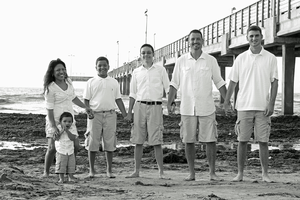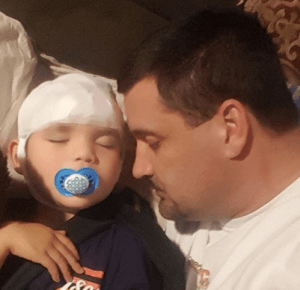Just because we are raising a child with special needs doesn’t mean that we are any different than any other family. Take time to get to know more about us. With that, I will share about our family so you may have an idea about our family dynamic. We have been so blessed with four intelligent young men. I have been blessed with the most amazing, incredible, and supportive wife who continues to astound me with her warm heart, patience, dedication, love, and daily sacrifices for the family. I couldn’t carry this load alone, and I thank God for her every day.
Between the two of us, we have four amazing boys. The oldest is 26 and recently graduated college and received his pilot’s license. He and his wife have two beautiful children. Next would be our 23 y/o who is an Army officer and graduated summa cum laude from college. Then we have a 16 y/o who amazes us with his brains even though he was diagnosed with ADHD.

Lastly, our youngest, Matthew, who is almost 7 years old, has the most contagious smile and is the reason we are embarking on a blog to raise awareness about Angelman Syndrome.
Now that you know a little about our family let’s get to other things that we feel you need to know about a special needs family.
At first glance, people can never tell that our Matthew is any different from other 7 y/o’s. No matter where we go, complete strangers are always making the same comment: “That’s the happiest little boy I have ever seen,” because he always has a smile on his face, but when they get close to him, because of his sensory issues and his lack of ability to verbally communicate, he erupts or hits them instead. Many times they take it personally and/or feel they have done something wrong, and there are times, due to being unaware of his condition, some are quick to assume that we need to be better parents and teach him manners. Matthew was born premature, has heightened sensory; his Angelman Syndrome diagnosis has caused a major delay in his gross/fine motor skills, he has apraxia and ataxia impairment. All of which adds to why he may, at times, respond with frustration. Unfortunately, because he may appear physically a typically developing toddler, it is a lot easier for some to assume it is a behavioral issue rather than a disability.


Matthew was born prematurely, so initially, we thought his delays were due to this. The more developmental milestones have been missed, the more questions we’ve raised with the pediatrician. We were always reminded that all kids don’t develop the same way. At 18 months, our pediatrician diagnosed him with Global Developmental Delays (GDD.)
After nearly two years of waiting, we were getting angsty about Matthew’s lack of improvement. We decided to ask for a second opinion and reached out to a different pediatrician. Our new pediatrician, Alecia Hanes, MD, of Yukon Pediatrics, has been a God-sent to our family. She has been instrumental to Matthew’s diagnosis. Within the first five minutes of our visit, she told us that Angelman Syndrome might be a possible avenue we need to research. We had never heard of “AS,” but we started researching it, and Matthew had 99.99% of the symptoms, so we knew that she was probably right.
The downside was we needed to take him to see several specialists to confirm the possible diagnosis. For the next six months {it feels like an eternity}; Matthew had to undergo multiple needle sticks, CT Scans, MRIs, psychological, hearing, and vision evaluations. You name it, and he had it. To this day, when we go to the doctor, he immediately shakes his head of disapproval.
At the age of 2 1/2, Matthew still couldn’t talk, crawl or walk. All the specialists were in agreement that he needed the genetics testing. Unfortunately, our insurance BCBS Federal denied the testing and sent us a letter saying the following: “Genetics testing has been denied due to a diagnosis will not change therapy needed. “ As you can imagine, this was not only upsetting, but it was heartbreaking too. They clearly didn’t understand and/or care how important a diagnosis was for our family. A diagnosis would be significant in helping us change the way we were approaching intervention, so instead of fighting with the insurance company, we took the letter to our pediatrician and the specialists we had been working with. We explained the situation and asked for their help. They supported us and fought for us.
We continuously extend our gratitude to these amazing medical professionals whom we drew our moral support; Dr. Alecia Hanes, Eileen Braun, Drew Cratsenberg, Dr. Carlos Bacino, Dr. Klaas Wierenga, and the diagnostic experts at GeneDX because they helped us get the testing that led to Matthew’s official diagnosis of “Angelman Syndrome.” If not for their ongoing support and guidance, we would probably still be fighting with the insurance company.
You may be thinking the same thing as we did … what is Angelman Syndrome? Feel free to CLICK HERE to learn more about AS.
My wife and I view stress differently. My weak tendencies are my wife’s strength. She is the disciplinarian while I am the playmate. In my kids’ eyes, I am the good cop while my wife carries on the bad rap. She teaches him so many things that he needs to know in the “real world” — and very focused on the long-term goal. While I am discovering the many things that Matthew has learned from my wife, I can’t help but worry about the “intangibles of the future.”

Those who know me can attest that I joke all the time. My wife always tells me that I don’t know how to be serious. What many don’t know, including my closest friends and family, after Matthew’s issues arose, I rarely express my deepest feelings. Instead, I internalize the problems we deal with and swallow them whole. I never show my vulnerable side because that is what a strong father, husband—a strong man—is supposed to do. I don’t want anyone to know how terrified I am at times. Too often, I worry about Matthew. Am I helping him too much? Am I not helping him enough? What if I’ve missed something—a treatment or a diagnosis and that window of time to treat it? What about his future? Will there ever be a cure? Will he ever drive a car? Will he ever get married? Will he ever be able to live independently? I am always in the “what if” — thinking of the hurts he will experience if he doesn’t catch up and is tagged as “different” by other kids in this harsh world. My biggest fear by far is who would care for Matthew if anything were to happen to my wife and me. That is a paralyzing fear that I do my best to not think about and rely on my faith in Jesus Christ. “Trust in the LORD with all our hearts; and lean not unto our own understanding. In all our ways acknowledge him and he will direct our paths.”

All parents can attest that parenting is an exhausting endeavor; however, parenting a child with special needs pushes us to an entirely new level of exhaustion. Even if we get a good night’s sleep or have time off, the level of emotional and physical tiredness is always evident. There are days that it is bearable, and there are days we are on our knees asking God the “whys.”
When Matthew was very young, the hospital and doctors’ visits are multiple times each month instead of a few times each year. The therapy sessions are multiple times each week. Our spare time after working hours meant we are catching up on a “variety of in-home therapy.” Early intervention was integral. No matter how tiring it can be, we remained hopeful that our hard work will pay off. We were finding alternative ways to improve his mobility, engaged him to learn adaptive sign language (video,) or searching for additional means to gain momentum with any forms of communication. You see, Angelman Syndrome diagnosis will never use their voice.
Then there is the time we spent advocating for him in the medical and educational systems. The emotional stress of raising a child with special needs has peaks and valleys that seem so much more extreme than those found in regular life. We are fortunate that the employers my wife and I have, recognize the importance of family. I truly appreciate my employer Dell Technologies for their support and being a company that supports the work/life balance. They have allowed me to arrange my schedule around Matthew’s appointments, work from home when needed, and truly understand if I need to rush to an appointment for a last-minute fill-in if my wife isn’t able to.
We are fearful; therefore, we are protective due to a fear that something could happen to Matthew since he can’t protect himself the way a so-called “normal” child can. Worry is always behind our minds since he can’t say “stop” or “don’t” or that he won’t be able to express this until it’s too late. We are cautious that people simply won’t understand him and have already experienced the sideways glances and rolled eyes from strangers when we go out to eat. He may throw food or does something they consider rude or disrespectful. Typically, when strangers approach him, they don’t know he has a disability, so it makes going out even more difficult.
Matthew’s ataxia causes him to lose his balance easily. We are blessed that Matthew has gained momentum with his mobility. He can walk, run, skip, hop, climb, and even danced. However, just because he is mobile doesn’t mean we aren’t protective. We are constantly vocal about his balance issues, and if there is no supervision, he does not know how to act quickly when imbalance causes him to fall. This past school year, he had two concussions from falls while at school.


This is just an example of what one fall did, and it’s instances like this, which caused us to be so overly protective. We know accidents will happen, but when your child can’t speak and explain what happened, you do all you can to protect them 24/7/365.
If he’s with us, we are constantly watching to make sure he is okay. If and when we attend parties and gatherings, we take turns making our rounds and say “hi” to everyone, but we can’t stay and mingle for the reasons mentioned above. If he’s not with us, then we’re worried that something will happen to him when he is away from us. We don’t go out with friends the way we used to. It is frightening to leave him with someone who might not understand what he’s trying to say or sign. Sometimes it’s even too hard to get your own family to understand just how stressed we are. Our social life has been limited outside the confinement of our home. We have limitations when we go out, especially when we have Matthew. Social interactions with friends are limited; however, because of these limitations, we have a stronger bond as a family unit.
The simplest thing can cause Matthew to get sick easily. So we try to limit things. For instance, we love the outdoors, but we try not to let him get in creeks, rivers, ponds, or lakes because he is prone to catching viruses. His love of water means he will try to taste the water, no matter where we are. We are overly protective because we don’t want to spend another night in the ER.
Even with the beautiful family and the blessings we have been given, there are times we can’t help but feel a small pang of jealousy when a so-called “normal” 7 y/o runs past us or is carrying on a conversation with their parents in a way that we wish our little boy could. Then we feel terrible because that child didn’t ask for our son to have a disability. That child doesn’t realize when they call out “I love you daddy” that I sometimes think — “why?” — why did this happen to my son, and why can’t I hear my son say that?. Then the guilt comes flowing in like a wave crashing ashore, so we push those thoughts as far away as possible. We are so proud of everything Matthew has been able to accomplish. Our little boy has worked harder than any of our other boys. Mobility and verbal communication came easy with our other boys, but Matthew has to work tirelessly on attaining these skills.

Our son is awe-inspiring. Many days we want to shout from the top of a mountain about how funny and cute he is; or how he strive to learn new skills. Other times, when we are having a rough day due to the challenges of Angelman Syndrome, we might not say much.
We don’t often share with others, even close friends and family the depths of what we go through when it comes to Matthew. We know that everyone has their own battles so we don’t want to burdened them with our struggles. We do appreciate when people ask us about our son, but if we are not sharing, please don’t think that there isn’t a lot going on underneath or that we don’t want to let you in. Our priority is making sure he gets to live his life to the fullest and to help raise awareness about how truly amazing the individuals with special needs. Matthew has helped us see it clearly.

True love is meeting someone exactly where they are—no matter how they stack up against what the world thinks they “should” be.
Raising a child with special needs shatters all the expectations that we build our lives around and pushes something else to the core; instead, that something is — love and understanding.
If and when Matthew is able to read this, we want you to know that we have NEVER regretted a second with you … you have made us better parents, better people, and a stronger family. You amaze us every day with your accomplishments, your smile, and the love you show us daily is what gets us through every day. We will always be your voice and help tell your story.
We only wish that you were our first child because you have opened our eyes to all the things that we took for granted with your older brothers.

To our friends, family, and future friends:
We haven’t had the pleasure of meeting yet, or strangers who may know and love a special needs family somewhere; please strive to include, work to understand, go out of your way on occasion to help a family who has a child with special needs.
Realize that the stress and strain take their toll. We’re doing our very best to be more engaged and to survive, but if we seem to seclude ourselves or have somehow offended you with our actions; we ask that you forgive us for our moments of weakness.
Hopefully, this post helps you understand more of why we may not attend events, socialize as much or seem that we are not fully engaged. Just know that we do our best to make our family life look normal and to act like all is fine, yet inside we hope that you might see through that facade every once in a while and understand that we truly appreciate the slightest effort to make us feel as special as our special little man.
Sincerely,
The Cook Family